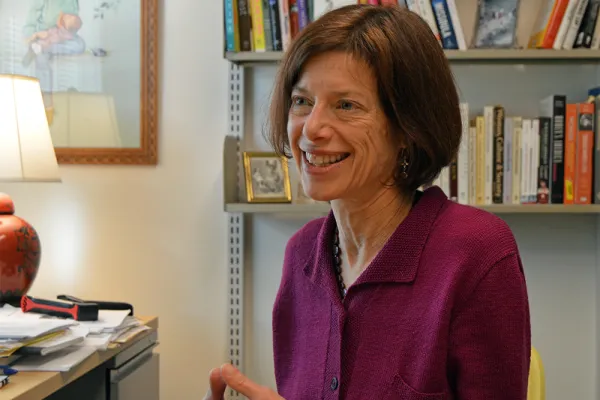A Conversation with Susan Faludi
Research & Inquiry

Published November 7, 2017
While working on “Death of a Revolutionary,” her 2013 New Yorker magazine article about radical feminist Shulamith Firestone, journalist Susan Faludi turned to Smith’s women’s history archives for material about her subject. The college’s extensive Sophia Smith Collection is a resource Faludi says she’s excited to have close at hand in her position as the college's Joan Leiman Jacobson Visiting Nonfiction Writer.
“I’m really interested in the history of the college and the story of Sophia Smith,” says Faludi, a Pulitzer Prize-winning reporter and author who will be teaching at Smith over the next four years. (Her husband and fellow writer Russell Rymer, is the college’s Elizabeth Drew Professor of English Language and Literature.)
In her “Writing Women” course this semester, Faludi and her students are exploring the vital process of telling women’s stories through interviews with local artists, entrepreneurs and activists.
Faludi has dedicated her career to uncovering such stories, starting with her groundbreaking 1991 book, Backlash: The Undeclared War Against American Women. In subsequent books and magazine articles, Faludi has trained a feminist eye on such complex subjects as American masculinity and the country’s response to the September 11 terrorist attacks.
Faludi’s most recent work, In the Darkroom, opens a personal window onto her relationship with her late father, who transitioned to womanhood at age 76.
Faludi says approaching that project as a journalist “is what allowed us to reconcile. It provided a buffer and allowed us to build a new relationship. Being a reporter was a gift to me—and to my father, who really wanted to tell the story of her life.”
Here’s what else Faludi had to say about writing, feminism and being at Smith.
What are you focusing on in your “Writing Women” class?
“My students are sending themselves out to interview women in the greater Northampton area. I tried to gather some names ahead of time and found an embarrassment of riches in this case—there are so many women artists, writers and activists in the region. A lot of women’s stories have been overlooked or have been misrepresented by what is still a somewhat male-dominated media. Part of what the class is exploring is what it means to tell a ‘female’ narrative. My students are using journalistic skills to tell these stories in a more literary, magazine-style way.”
There are far fewer outlets these days for magazine-style writing. What do you tell your students about that?
“I do sometimes feel like a blacksmith passing on my trade. I came up through the San Jose Mercury News’ Sunday magazine, back when there were four full-time writers and three full-time editors. Now the Mercury News is only online. Early on, the hope had been that the Web would open new venues for female writers. But the conditions under which many online journalists are working now—low pay, no benefits, little to no editing, having to write to draw a million eyeballs with click bait—is not the feminist utopia we’d imagined. On the bright side, some openly feminist writers are now being hired for the opinion pages of major newspapers. The Web has provided a non-traditional channel to rise in traditional media.
What are the stories about women that need to be told in 2017?
“As important as it is to be hammering on the issue of sexual assault, I wish there was more attention being paid to bread-and-butter economic issues. What’s forgotten is that women in the U.S. are facing record rates of poverty and rising occupational sex segregation. The top 10 jobs for women are the same as they were in the 1950s and ’60s—home health care aides, sales clerks, grade school teachers. Economic inequality is clearly a huge force in society right now, and how that affects women often gets overlooked.”
How would you describe the present historical moment for women in the U.S.?
“I feel like we’re having a backlash and a frontlash at the same time. The Trump Administration is tearing down everything it can having to do with women’s rights. At the same time, women have been leading the charge in fighting back, starting with the Women’s March.”
We hear a lot about young women no longer identifying with feminism. What have you heard from your students at Smith?
“Students in my class all seem committed to women’s equality—to giving women voice and agency. They are pretty sophisticated in their understanding of feminism, and that’s been wonderful for me! Students here have also been willing to throw themselves out of their comfort zones to interview people of different backgrounds. They’ve been doing a great job of being adventurous.”
Pulitzer Prize-winning journalist Susan Faludi is the Jacobson Visiting Nonfiction Writer at Smith. Photo by Maryellen Stohlman-Vanderveen '19